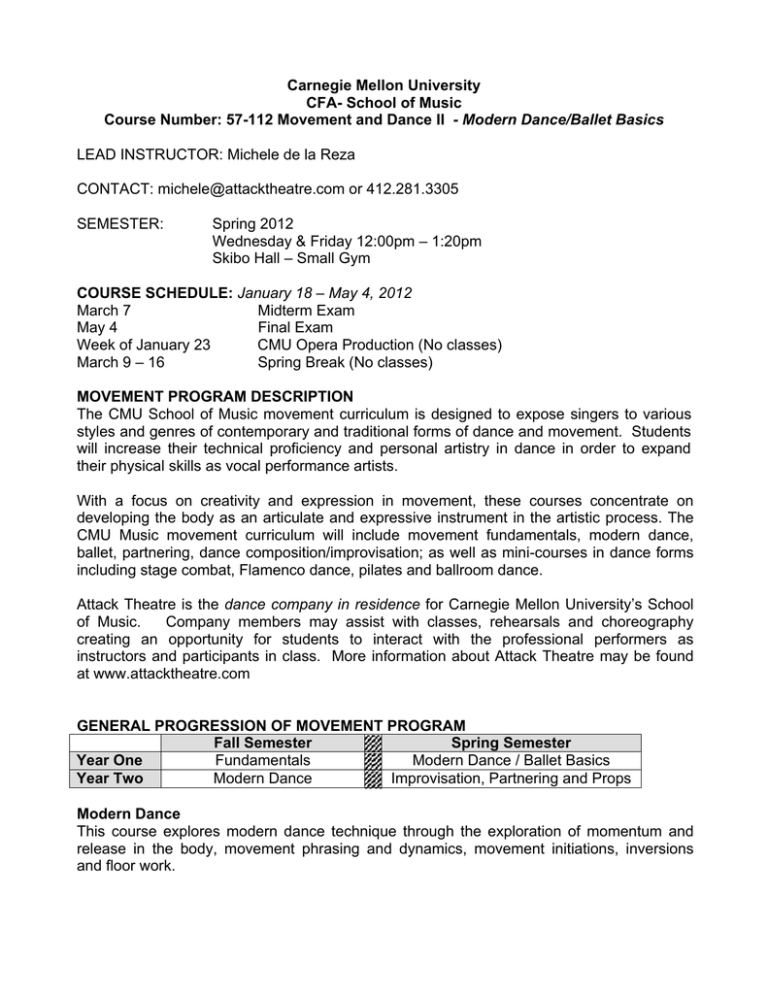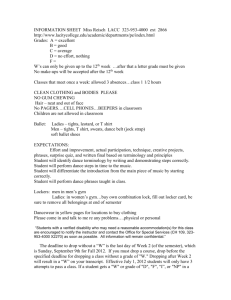Carnegie Mellon University CFA- School of Music Course Number
advertisement

Carnegie Mellon University CFA- School of Music Course Number: 57-112 Movement and Dance II - Modern Dance/Ballet Basics LEAD INSTRUCTOR: Michele de la Reza CONTACT: michele@attacktheatre.com or 412.281.3305 SEMESTER: Spring 2012 Wednesday & Friday 12:00pm – 1:20pm Skibo Hall – Small Gym COURSE SCHEDULE: January 18 – May 4, 2012 March 7 Midterm Exam May 4 Final Exam Week of January 23 CMU Opera Production (No classes) March 9 – 16 Spring Break (No classes) MOVEMENT PROGRAM DESCRIPTION The CMU School of Music movement curriculum is designed to expose singers to various styles and genres of contemporary and traditional forms of dance and movement. Students will increase their technical proficiency and personal artistry in dance in order to expand their physical skills as vocal performance artists. With a focus on creativity and expression in movement, these courses concentrate on developing the body as an articulate and expressive instrument in the artistic process. The CMU Music movement curriculum will include movement fundamentals, modern dance, ballet, partnering, dance composition/improvisation; as well as mini-courses in dance forms including stage combat, Flamenco dance, pilates and ballroom dance. Attack Theatre is the dance company in residence for Carnegie Mellon University’s School of Music. Company members may assist with classes, rehearsals and choreography creating an opportunity for students to interact with the professional performers as instructors and participants in class. More information about Attack Theatre may be found at www.attacktheatre.com GENERAL PROGRESSION OF MOVEMENT PROGRAM Fall Semester Spring Semester Year One Fundamentals Modern Dance / Ballet Basics Year Two Modern Dance Improvisation, Partnering and Props Modern Dance This course explores modern dance technique through the exploration of momentum and release in the body, movement phrasing and dynamics, movement initiations, inversions and floor work. Ballet Basics This course is designed to increase flexibility, balance and articulation through the execution of classical ballet vocabulary and alignment to enhance strength and fluidity in performance. Mini Workshops These classes, held each year and taught by specialists, are an intensive period of study around a specific movement concept including but not limited to: stage combat, ballroom dancing, tai-chi, yoga and pilates. OBJECTIVES: • The student should improve posture, flexibility and strength. • The student should develop kinesthetic awareness and physical confidence through structured and improvisational movement based activities. • The student should analyze and explore principles of movement. • The student s h o u l d work individually and cooperatively to explore creative and improvisational concepts to generate movement. • The student should expand movement vocabulary and enhance ability to perform basic dance vocabulary. ASSESSMENT: The student will be assessed by: • Demonstrating sound alignment principles while performing class phrases as an individual and in groups. • Participating fully in full class and peer discussions. • Demonstrating understanding and mastery of basic dance vocabulary as part of inclass assignments. • Demonstrating understanding of concepts in all creative assignments performed in class. • Completion of all journal assignments. • Completion and demonstration of concepts in all written assignments. SUPPLIES: • Dance notebook/journal and pen • Tights, running tights, leggings or biker/short tights • Leotards, unitards, form-fitting exercise tanks, Men - solid-colored form-fitting tops • Bare feet. Ballet shoes or socks will be required for ballet class • In winter months, warmer clothing may be worn at the beginning of class • Attire for mini-workshops and master classes will be specified by the instructor REQUIREMENTS: 1. Regular and prompt attendance 2. Cooperative and active participation in class 3. Constructive and positive use of corrections and feedback 4. Completion of all assignments 5. Adherence to all protocols and policies 2 PROTOCOLS AND POLICIES 1. Attendance: Prompt and regular attendance is essential to acquiring and improving performance, technical skills and class material. Students are allowed 2 absences before the grade is affected. 3 absences result in a decrease of 10 points of your attendance grade, 4 absences result in a decrease of 20 points, 5 absences result in a decrease of 30 points, 6 absences result in a decrease of 40 points. Students are not permitted to make-up unexcused absences. 2. Excused absences: Students may be excused for auditions to graduate schools and for approved professional opportunities. Students may be excused for extreme and extended illnesses as documented by a doctor. Students may be excused for family emergencies such as death or severe illness. In order to receive an approved absence, students must submit the following PRIOR to the date of absence. Please see Sharon Johnston if you have any questions regarding the definition of an excused absence a. A typed description that includes: Name of Student, Course Number/Name, Date of Absence(s), Reason for Absence. b. The above description may be emailed to the instructor. 3. Injury and illness: Students with injuries or non-contagious illnesses are expected to attend and observe class. Three observations in one semester will equal one absence. 4. Instructors will determine if any attire is unsuitable for the specific class. Hair should be free from the neck and face. Jewelry and gum chewing are not permitted. 5. Students are not permitted to change clothes or use the inner room of the dance studio. 6. There is to be no food or drink in the studio at any time. Water bottles are allowed and encouraged. GRADING POLICY A = 90 – 100 points B = 80 – 89 points C = 70 – 79 points D = 60 – 69 points F = 59 points and below 50 points 30 points 10 points 10 points Attendance Participation in class, completion of assignments and physical improvement and demonstration of skill acquisition Mid Term Final Examination 3

